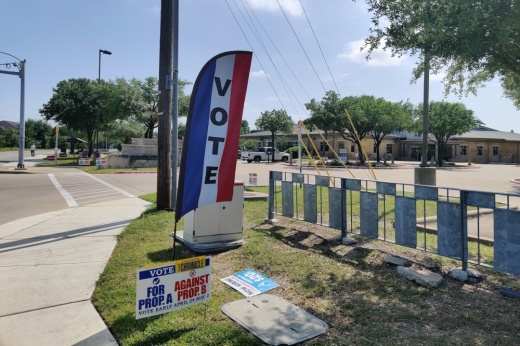The big picture
Two items, both called the Austin Police Oversight Act, are on the ballot.
The first, Proposition A, was developed by the local criminal justice reform group Equity Action last year. Equity Action is supporting the Yes on A No on B campaign involving many local activist and political organizations.
The ballot language reads: “Shall the voters of Austin adopt an initiated ordinance, circulated by Equity Action, that will deter police misconduct and brutality by strengthening the City's system of independent and transparent civilian police oversight?”
This year, Equity Action mainly garnered political contributions from a range of local donors. Its largest contributors—the Los Altos, California-based Heising-Simons Foundation, and the Tulsa-based Charles and Lynn Schusterman Family Philanthropies—together donated $375,000, or nearly 99% of its financial backing.
The second, Proposition B, was developed by Voters for Oversight and Police Accountability.
The ballot language reads: “Shall the voters of Austin adopt an initiated ordinance, circulated by Voters for Oversight and Police Accountability, that will strengthen the City's system of independent and transparent civilian police oversight?”
VOPA received $287,000—more than 99% of its financial backing last year—from the Austin Police Association and is based on Equity Action’s original measure with many adjustments. VOPA attracted criticism last year due to reports that its canvassers falsely claimed to work for Equity Action and the Proposition A petition drive, and hundreds of signatures on VOPA's petition were withdrawn before its validation.
If either proposition passes—but not both—city policy regarding police oversight would be repealed and replaced with the winning measure. If both measures pass, the city said they would each be added to Austin's code as separate chapters covering police oversight.
The details
While the propositions share the same name and nearly identical ballot captions, the actual effects of either item’s passage on Austin’s system of police oversight would be significantly different. The contents of Proposition A, if fully implemented, would result in a stronger civilian police oversight system than Proposition B.
The Equity Action-backed Proposition A includes a slate of provisions related to the oversight of police officers, including:
- The officer complaint and discipline process, and whether anonymous complaints are allowed;
- The role and powers of Austin’s Office of Police Oversight in officer investigations;
- Reviews of policing incidents, including the police chief's role;
- Public access to APD personnel and investigation information; and
- Candidacy for joining civilian police review boards.
“The real Austin Police Oversight Act, Prop A, authorizes civilians to do basic fact-finding around complaints against police, ensures that police and residents can file anonymous complaints if they fear retaliation, authorizes recommendations to the chief, and creates greater transparency in cases where there is a dispute between the civilian oversight team and the chief about discipline,” Equity Action board President Chris Harris said in a February statement. “This is a moderate proposal that builds on the best things about our current system, before it was blown up in 2021 by police association grievances.”
Even if it passes, however, all proposed changes may not be immediately implemented due to possible conflicts with state law and the process of labor negotiations with the Austin Police Association.
“The legal effect of the Equity Action petition, whether it’s in effect, if there is no contract, many of those provisions and the will of the voters, quite frankly, will not come to pass,” Rebecca Hayward, an attorney working with the city’s labor relations office, told City Council during a February discussion.
The VOPA- and police union-backed Proposition B took much of Proposition A’s language and edited it to align more with current systems without expanding the Office of Police Oversight's powers or civilian oversight.
While previously telling council the police union welcomed oversight of its officers, Austin Police Association President Thomas Villarreal recently testified to state lawmakers that civilians should not be involved in the process.
“If I didn’t have to negotiate contracts, right, if that wasn’t a thing, I would say they have no role in that,” Villarreal said during an April 3 legislative hearing on Senate Bill 2209, which would ban civilian involvement in police oversight investigations.
Zooming in
In Austin, police oversight is mainly regulated by state law and through the city’s contracts with its police union. Austin’s policing system is governed by Chapter 143 of the Texas Government Code, which covers policies including officer investigations that must be decided in police contracts.
The city’s last labor agreement with the police union expired in March. While the city’s labor team and the Austin Police Association reached a tentative agreement on a new four-year deal in February, Austin City Council did not act to pursue that option; instead, members asked staff to negotiate a new one-year deal with the police union to allow the May election to play out before putting a new long-term labor deal in place.
The police association declined to come back to the bargaining table, and pieces of the contract defaulted—while some new incentive and benefit provisions are now in place based on council action.
The city's labor team contended in February that the four-year contract outline had included several strengthened oversight measures and that any future deals negotiated after the May election—even if Proposition A were to pass—would not end up with as many changes in line with Equity Action's goals.
Several council members said regardless of the contract status, they wanted to wait on the election to gauge the will of the voters before signing off on the next Austin Police Association contract.
Diving deeper
Beyond the one-sentence ballot captions, the proposed ordinances tied to propositions A and B cover a wide range of details in the city's police oversight system.
The full contents of the Proposition A ordinance may be viewed here, and the full Proposition B ordinance may be viewed here.
A redlined version of Proposition B's edits to the original Proposition A drafted by Equity Action may be viewed below.





